The University of Texas at Austin :: iGEM Team
Here for images from SXSW Create 2015?
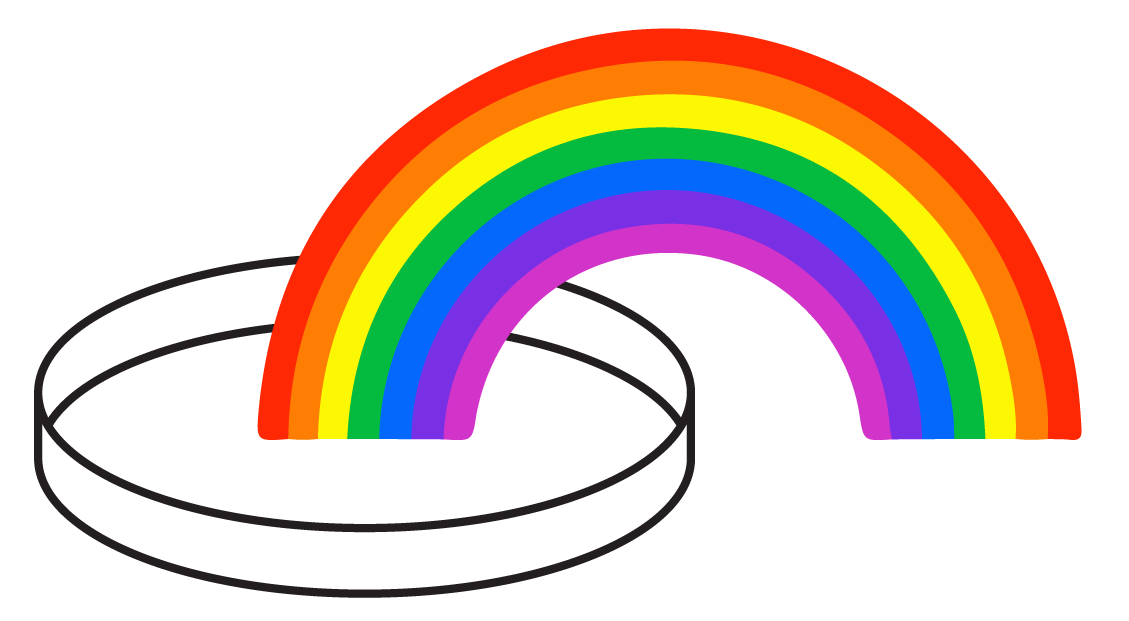 Click here for the full gallery!
Click here for the full gallery!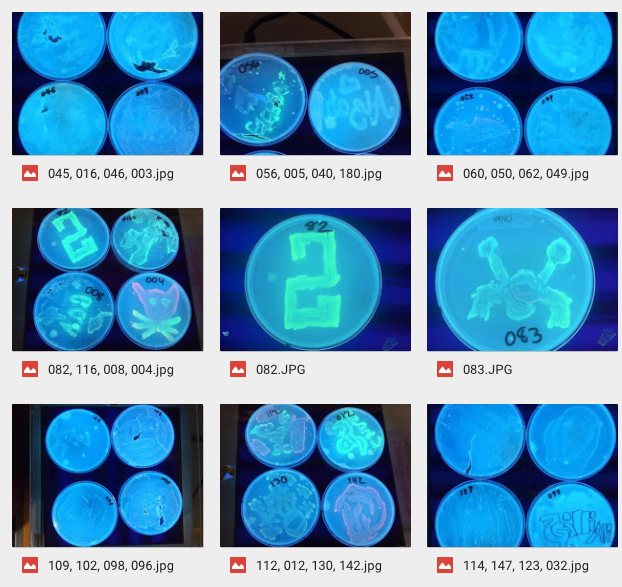
What is synthetic biology? What is iGEM?
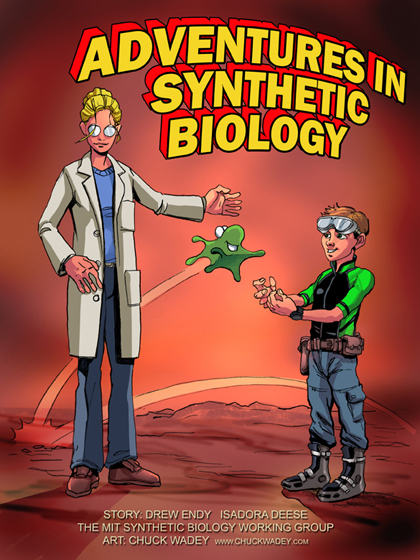 |
"Synthetic biology is the design and construction of biological devices and systems for useful purposes." –Wikipedia page For a flavor of what synthetic biology is like, check out the Adventures in Synthetic Biology comic. |
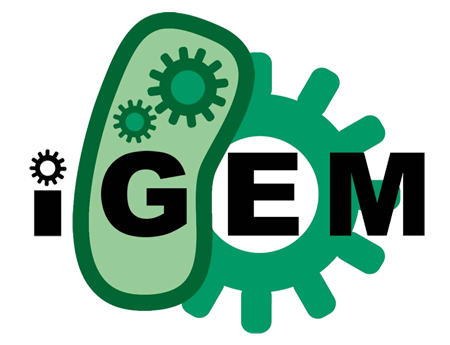 |
"The International Genetically Engineered Machine competition (iGEM) is the premiere undergraduate Synthetic Biology competition. Student teams are given a kit of biological parts at the beginning of the summer from the Registry of Standard Biological Parts. Working at their own schools over the summer, they use these parts and new parts of their own design to build biological systems and operate them in living cells." –iGEM Foundation |
Past UT Austin iGEM Team Projects
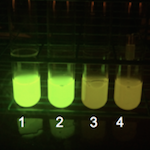 2015 iGEM Team Breaking is Bad |
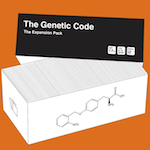 2014 iGEM Team GC Expansion Pack |
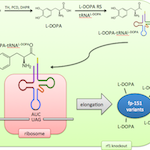 2013 iGEM Team MAPs and Bioscrubber |
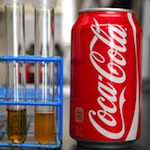 2012 iGEM Team Decaffeination |
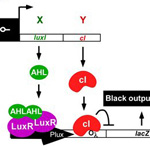 2006 iGEM Team Edge Detector |
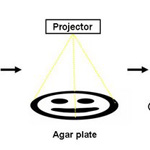 2005 iGEM Team Edge Detector |
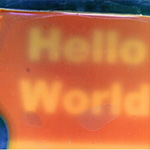 2004 iGEM Team Bacterial Photography |
Interested in joining the *2015 iGEM Team?
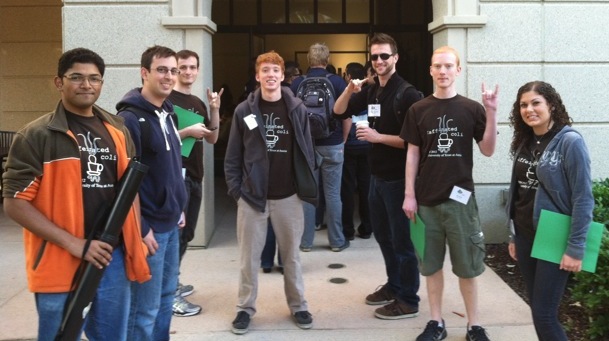
2012 iGEM team at the America's West Jamboree at Stanford *See below for expectations. *See below for application process.
Expectations for members of the team
- Previous experience
- It is expected that new iGEM team members will have previous research experience in a field such as: biology, molecular biology, chemistry, engineering, computer science, programming, phsyics, math, etc.... Many members have participated in the Freshmen Research Initiative (FRI) here at UT or previously worked in a research lab on campus. Previous research experience is not an absolute requirement for highly motivated students.
- We encourage non-biologists to apply. Many of the most successful and interesting iGEM projects of all time have had contributions from computer scientists, physicists, mathematicians, game programmers, graphic designers, visual artists... This year we are particularly interested in recruiting students with programming and artistic backgrounds.
- Spring: Weekly Discussion Meetings on Synthetic Biology
- In the past, new students were required to participate in the synthetic biology seminar course taught by Professor Barrick and Dr. Dennis Mishler. However, this course will not be offered in 2015. Instead, you will attend weekly meetings (~2 hrs) examining the field of synthetic biology: discussing important papers, presenting past winning iGEM projects, and working as part of a group to propose an iGEM-style project that the team might work on during the summer. THIS IS AN ABSOLUTE REQUIREMENT.
- The weekly meetings will follow the format of our 2014 course: 2014 Synthetic Biology Course
- Weekly meeting times will be scheduled in January 2015.
- On some weeks you will lead the discussion and present, on other weeks you will be expected to participate.
- Spring: Begin Research and SXSW Create
- Main objective is to learn techniques and perform exploratory projects under the supervision of current team members.
- In 2014 the UT iGEM team participated in SXSW with a research project. We hope to participate in 2015. All member are expected to use this as a learning experience.
- Write research proposals and apply for summer funding/fellowships. Several research fellowships will provide a research stipend for full-time work during the summer. All iGEM team members will be required to apply for funding, under the guidance of Professor Barrick and Dr. Mishler.
- Brainstorm and find funding sources for iGEM summer work and travel to the competition. Research is not cheap, and neither are scientific conferences. Members of the iGEM team will search for local sponsors and other organizations that might help cover the costs of doing undergraduate research.
- Summer: Main Work on iGEM Project
- Expected to contribute 20-40+ hours of work per week for most of the summer on the iGEM project
- Students will be largely independent with access to UT researchers, such as Dr. Mishler and Professor Barrick, who can provide feedback, insight and suggestions to assist your research.
- Students will have daily small meetings with Dr. Mishler and weekly team meetings with Dr. Mishler and Professor Barrick.
- If sufficient time is spent writing a proposal and working on a specific project, signing up for research credit is possible.
- Team members will have specific responsibilities to finish to prepare us for the fall competition, such as website construction, making figures, or powerpoint presentations.
- As our big Conference (Jamboree) will be in September this year, much of that preparation will need to be finished by the end of August.
- Fall: Prepare for and Attend Jamboree, September 24th-28th
- Includes creating a multimedia website and presentation describing the project.
- ~2 team members will be asked to sign up for fall research credit to help finish the iGEM-related research.
- Selected students who have made the greatest contributions to the iGEM project will attend the Jamboree and present the team's project. (Number depends on sponsorship of team and available resources. We have had some success with students receiving travel grants.)
- iGEM projects may lead to work that is published in scientific journals with team members as co-authors. This is a stated goal for both Professor Barrick and Dr. Mishler. For an example of a past UT Austin iGEM project, check out this ACS Synthetic Biology article: Decaffeination and measurement of caffeine content by addicted Escherichia coli with a refactored N-demethylation operon from Pseudomonas putida CBB5.
How to Apply
- Send a resume (or CV) and a short (<1-page) statement about why you are interested in synthetic biology.
- Your resume/CV should include your GPA, your expected semester&year of graduation, and what science-related courses you took in the fall 2014 semester.
- As part of that <1 page statement, please refer to one of your previous research experiences and how that experience will make you a great iGEM teammate. Include at least one idea you have for a possible project or use for synthetic biology to improve society. (it doesn't necessarily have to be realistic for an iGEM project). Mail your application as a PDF to utigem@gmail.com . You will receive an e-mail confirmation once we have begun looking at your application.
- DEADLINE: Applications are due by January 9th to receive full consideration. Exceptions for late applications may be made, but full consideration IS NOT guaranteed.
- We will begin contacting students who have applied starting on January 9th to arrange interviews with team advisors. If you will not be in Austin until after January 16th, please let us know. Final decisions will be made upon completion of interviews, hopefully prior to Jan. 20th.
- Depending on the number and quality of applicants, we expect to be able to accommodate 4-8 new students on the team.
Barrick Lab > UTiGEMTeam
Contributors to this topic  JeffreyBarrick, DennisMishler, AlexaMorton, CameronRoots
JeffreyBarrick, DennisMishler, AlexaMorton, CameronRoots
Topic revision: r19 - 2015-09-19 - 04:09:13 - Main.JeffreyBarrick

 Mol Biosciences
Mol Biosciences The LTEE
The LTEE iGEM team
iGEM team NGS course
NGS course